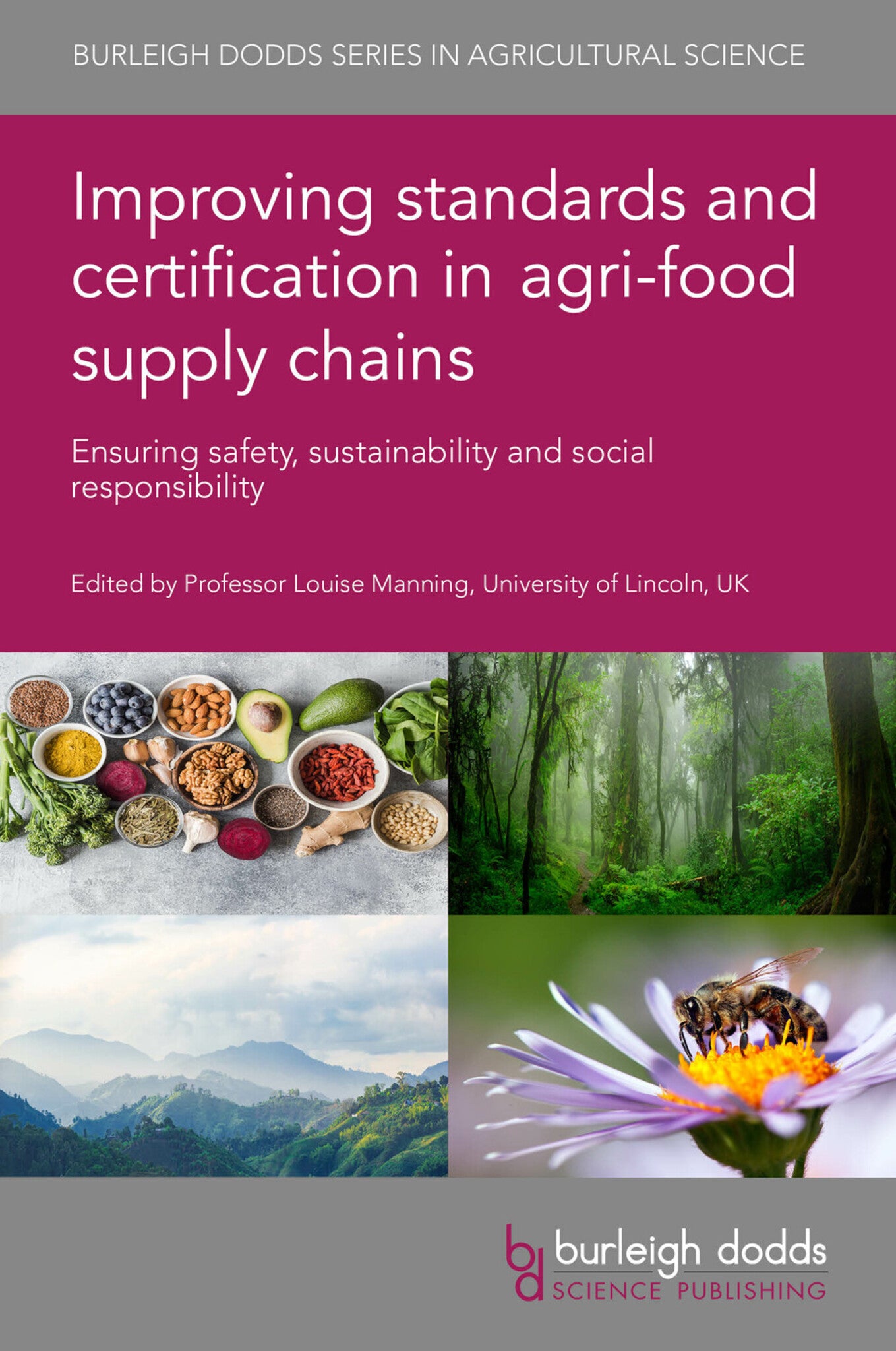We're sorry. An error has occurred
Please cancel or retry.
Improving standards and certification in agri-food supply chains

Some error occured while loading the Quick View. Please close the Quick View and try reloading the page.
Couldn't load pickup availability
- Format:
-
12 November 2024

- Considers a range of techniques used for measuring compliance and improving performance across the agri-food supply chain, including those used to measure on-farm carbon footprints and biodiversity
- Provides a useful and comprehensive context to the role of governments and other food safety agencies in setting safety, quality and sustainability standards for global agri-food supply chains
- Reviews the key issues in developing voluntary standards, focussing on those encountered during the development of robust carbon-neutral and biodiversity offsetting certification schemes

TECHNOLOGY & ENGINEERING / Food Science / Food Safety & Security, Sustainable agriculture, TECHNOLOGY & ENGINEERING / Agriculture / Sustainable Agriculture, TECHNOLOGY & ENGINEERING / Agriculture / Agronomy / Crop Science, TECHNOLOGY & ENGINEERING / Agriculture / Animal Husbandry, Food security and supply, Agriculture, agribusiness and food production industries, Agronomy and crop production, Animal husbandry

“From the very first pages, this collective work impresses with the rigour of its composition. A carefully-structured table of contents guides the reader through the multiple dimensions of agro-environmental standards – from their institutional definitions to the assessment of their impact on the management of quality, safety and traceability. The book also explores their practical implementation across diverse sectors such as regenerative agriculture, livestock farming, forestry, carbon markets, and Good Agricultural Practices (GAP) schemes. It will become an essential reference – helping policymakers, producers and researchers navigate the shifting complexities of these standards.” (Book Review Published in Nature Built Social Environment Health)
Part 1 Setting standards
- 1.The international context: the role of Codex Alimentarius in setting safety and quality standards for global agri-food supply chains: Tom Heilandt and Amanda Hielm, Codex Alimentarius Commission, Italy
- 2.The role of governments in driving sustainability standards: governance structures and green finance: Louise Manning, University of Lincoln, UK; and Aleksandra Kowalska, Maria Curie-Skłodowska University, Poland
- 3.The role and range of voluntary standards and certification systems governing sustainable agricultural practices: Mathieu Lamolle and Gregory Sampson, International Trade Centre (ITC), Switzerland
- 4.The role of non-governmental organisations (NGOs) in improving safety, quality and sustainability standards in agri-food supply chains: Pilar Pampin and Clare Mike, LEAF (Linking Environment and Farming), UK
Part 2 The expanding scope of agri-food chain standards
- 5.Sustainability standards and certification for agriculture: an overview: Anne Tallontire, University of Leeds, UK
- 6.Carbon farming, regenerative agriculture and environmental sustainability: practices and standards: Louise Manning, University of Lincoln, UK; and Rounaq Nayak, Bournemouth University, UK
- 7.Biodiversity and nature credit markets: opportunities and challenges for landowners and land managers: Jo Treweek, eCountability Ltd, UK
- 8.The role of standards in improving the sustainability of livestock production: current challenges and future perspectives: E.M. De Olde, Wageningen University & Research, The Netherlands; and K. McGarr-O’Brien, Wageningen University & Research, The Netherlands and Teagasc, Ireland
- 9.Developing good agricultural practices (GAP) across global agri-food supply chains: challenges and opportunities: Louise Manning, University of Lincoln, UK; and John G. Keogh, McGill University, Canada
- 10.Improving sustainable agricultural principles and practices: the Sustainable Agriculture Network (SAN): Mona McCord and Oliver Bach, Sustainable Agriculture Network (SAN), USA
- 11.Fulfilling the promise of sustainability certification: reflections from the Rainforest Alliance: Deanna Newsom, Rainforest Alliance, USA; Henk Gilhuis, Rainforest Alliance, The Netherlands; Rens Rutten, PUM Netherlands, The Netherlands; and Talia Sechley, Rainforest Alliance, USA
- 12.Forest certification – an answer to the challenge of sustainable forest management?: Anna Thorning, Mid Sweden University, Sweden and Cecilia Mark-Herbert, Swedish University of Agricultural Sciences, Sweden
Part 3 Measuring compliance and improving performance
- 13.The role of technology in monitoring and verifying safety, quality and sustainability in agri-food supply chains: Aleksandra Kowalska, Maria Curie-Skłodowska University, Poland; Laura Clapham, University of Cambridge, UK; and Louise Manning, University of Lincoln, UK
- 14.Measuring and improving good agricultural practices (GAP) related to safety of fresh produce: the case of controlled environment agriculture: Louise Manning, Lincoln University, UK; and Jim Monaghan, Harper Adams University, UK
- 15.Measuring and modelling on-farm greenhouse gas emissions : the basis for achieving climate-neutral farming: Matthias Kuhnert, Mohamed Abdalla, and Sylvia H. Vetter, University of Aberdeen, UK; and Durba Kashyap, INRA, France
- 16.The role of standards and certification in delivering safe, sustainable and socially responsible agri-food supply chains: Louise Manning, University of Lincoln, UK



